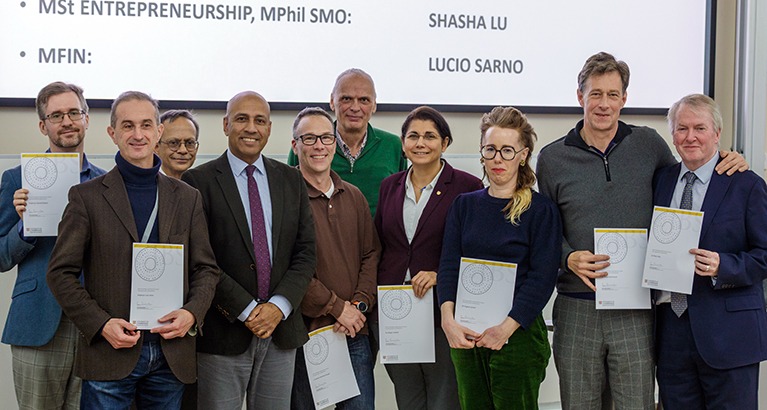The subject of ‘capitalism’ has since the writings of Karl Marx 175 years ago, often focused, for better or worse, on a sharp dichotomy between the means of production on one side and labour on the other side.
Similarly, says a recent study led by Dr Philip Stiles of Cambridge Judge Business School, technology has tended to be “conceptualised as either good vs bad, leading to the development of either a utopian or a dystopian future”. This casts technology as a “mechanism in class struggle” and thus produces a polarised picture of technology’s role in modern capitalism.
This view is short-sighted, says the study published in the journal ‘Business Ethics, the Environment & Responsibility’, because it fails to take into account the tensions and contradictions that technology can have both within organisations and society as a whole – as capitalism is “intimately bound up with technology” in many ways of varying nuance.
Key findings: technology’s role in modern capitalism
Philip talks about the 5 key findings of the new article:
1. There are 2 competing narratives in the literature on tech and capitalism
Some scholars in the labour tradition have focused on how digital technology has shifted far greater control toward the employer – including the ability to track employees electronically as workers become passive users of tech, leading to their deskilling. Other studies have found a “tipping point” in capitalism caused by digital technology: knowledge is spread so widely that capitalism loses its effectiveness as an economic approach and a new collaborative social order emerges, or increased unemployment caused by digitally driven automation could mark a crisis for capitalism through a strong negative effect on consumption by individuals.
2. The gig economy isn’t one dimensional
Discussion about the “gig economy” such as driving an Uber vehicle misses an important point. Debate has often focused on how the social contract may be changing through digitally based gigs, but a large percentage of such workers (48% in the UK) are full-time employees who are supplementing their income – so perhaps the talk about overturning the social contract is overdone. As we stay in the new article, “precarity is widespread across a range of occupations and practices, not just those on pure gig or zero hours arrangements”.
3. Many different types of ‘technostress’ are related to digital technology
These include:
- techno-overload: forcing professionals to work faster
- techno-invasion: professionals need to be constantly connected to be ‘reachable’
- techno-complexity: forcing professionals to learn new applications
- techno-insecurity: concern about losing jobs to people, often younger, who are more tech-savvy
- techno-uncertainty: constant changes and upgrades that don’t give people time to establish a base of experience before their knowledge is obsolete.
4. Technostress affects different people in different, and perhaps surprising, ways
One study found that while women found digital technologies more difficult to use, men suffer most from technostress – and perhaps because men use tech more and thus create their own stressful situations. Generational differences are also paradoxical, with older professionals experiencing less technostress than younger ones. The young may be digital natives, but older people were better at handling stress generally and had more seniority – and were thus likely to have more agency over their use of information technology.
5. Tech can affect autonomy, with mixed results
One study looked at how software to solve work scheduling issues freed up management while reducing autonomy for factory-floor workers in organising their production lines. This pleased some workers as they were happy to shed such responsibility, while others felt that they were being deskilled and that their jobs were now less interesting.
The article entitled “Technology, capitalism, and the social contract” is published in the journal ‘Business Ethics, the Environment & Responsibility’. It is co-authored by Philip Stiles, Associate Professor in Corporate Governance at Cambridge Judge, Eleanor Toye Scott, a Research Associate at the Centre for International Human Resource Management at Cambridge Judge; and Pradeep Debata, a Research Associate at the Centre. The study involves a review of academic literature about technology and capitalism, including a 2022 working paper by Philip and colleagues that looks at technology, developers and ethics.
How changes in technology can shift the boundaries of work
The study examines how new technology interweaves with notions about capitalism and arose because as technology changes and sets ever-shifting boundaries about what work entails, debates about the direction for capitalism inevitably arise – and that’s because “capitalism is intimately bound up with technology”, the authors say.
Common to both competing narratives identified in literature on this topic – greater employer control and increased unemployment – is a growing recognition that the traditional social contract is changing. That is, citizens have historically agreed to cooperate for an overall social good, but the traditional set of relations between the state, capital and labour is being tested in new ways.
“Our aim is to focus on current uses of digital technology and changes that are already present in the workplace and rely on empirical evidence rather than develop speculative ideas about large-scale economic and social change,” the authors say.
Our aim is to focus on current uses of digital technology and changes that are already present in the workplace and rely on empirical evidence rather than develop speculative ideas about large-scale economic and social change.
Using an ethical framework to help developers balance tensions
The 2022 study by Philip and colleagues involved interviews with 24 people working as developers across a variety of organisations including start-ups, corporations, and consulting firms – with an aim to understanding the demands placed on them and how they made sense of their work.
“As developers talked about their framing of the process of AI design and implementation, we heard their accounts of how they balanced tensions and dealt with novel situations and faced tight pressures to make decisions,” according to the new study. While speed and quality were key factors in decision-making, an ethical frame also played an important role – often resulting in different outcomes.
As one interviewee said: “Once you have ‘baked-in’ the assumptions it is difficult to change and if you release a product, it may potentially impact on millions of people…”.
But what is an ‘ethical frame’ in this context? While there may be an assumption that people respond to ethical issues by “borrowing directly from traditional philosophical ethics” such as virtue and reasoning, the context of such ethical frames for developers is often “characterised by equivocality and uncertainty, which may involve the existence of several different, simultaneous interpretations.”
As one might have expected in looking at the vexing issue of capitalism and technology, there are often no clear – or easy – answers to some of these ethical dilemmas. Putting a question into ChatGPT won’t solve them either, though it could identify various ideas floating about.
Dr Philip Stiles and his research into the future of work

Study co-author Philip Stiles is Associate Professor in Corporate Governance and Co-Director of the Centre for International Human Resource Management at Cambridge Judge Business School, where his focus is often on the future of work in such areas as leadership, organisational culture and change management – including how organisations adapt to the introduction of new technologies.
A previous study by Philip looked at the best ways to connect strategic human resource management (SHRM) to different models of firm-level corporate governance – which identified 4 firm-level ‘archetypes’ of corporate governance systems:
- shareholder value
- communitarian stakeholder
- enlightened shareholder value
- employee ownership.
The paper aimed to “refine the traditional shareholder-value versus stakeholder” debate in order to identify directions for future research on more sustainable models – to demonstrate “how different archetypes of corporate governance have different implications for SHRM, and also proposing the basis for an ‘alternative’ archetype based on the notion of corporate sustainability in order to address some of the shortcomings of traditional approaches.
Another previous study co-authored by Philip looked at how performance management can be reframed within a major multinational company – examining how individuals may differ in terms of their cognitive interpretations of new routines as well as their motivations to enact such changes.
Whereas prior studies had often identified conflict as a by-product of changes to routine, the study co-authored by Philip instead found that – given the complexity of conditions facing this Japanese company – an approach of “quiet questioning, probing and different enactments brought a form of ‘negotiated order’ to the changes”.
The study concluded with a suggestion that future research could examine power relationships between groups that inform the process of routine change, and to explore linkages between routines in order to more fully understand how organisations react to changes in routine.
Philip is a previous winner of the Pilkington Teaching Prize
Beyond his role within Cambridge Judge and the University of Cambridge – Philip has won both a Cambridge Judge Business School Teaching Award and the Pilkington Teaching Prize for Excellence in Teaching – he works with companies throughout the UK and around the world on workplace and leadership issues.
That work includes developing the Global Human Resource Research Alliance involving 30 companies including IBM, Infosys, Oracle, Siemens and Unilever.
Featured research
Stiles, P., Toye Scott, E. and Debata, P. (2023) “Technology, capitalism, and the social contract” Business Ethics, the Environment and Responsibility





